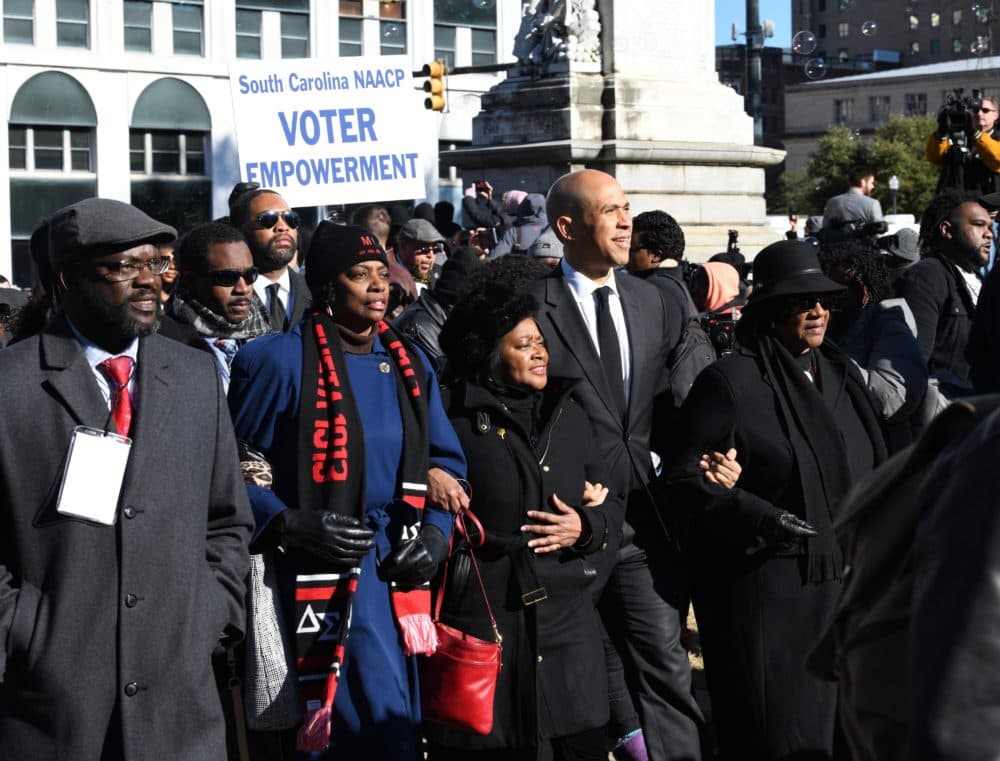Advertisement
Commentary
Are Democratic Candidates Actually Calling For Reparations? No

Slavery stripped black Americans of the financial fruits of their labor and more for most of the country’s first century. Jim Crow replaced chains of metal with ones forged of terror, most famously through lynchings, but also land theft. The contemporary form of bigotry’s financial toll is redlining, by which financial institutions withhold loans from minority neighborhoods.
This is not some academic history lesson. Today, white household wealth is 10 times that of blacks’. In a country that flatters itself with up-by-the-bootstraps mobility, many African Americans struggle for boots: Black children born into poverty are more likely to spend their lives poor than are their white counterparts.
Even successful African Americans are vulnerable. Those born into privilege are slightly more likely than rich, white kids to slip down the income ladder.
These facts, and the Democratic Party’s concern with identity, explain the debate in the nascent presidential race over reparations: the proposal to spend potentially trillions of dollars compensating not just African Americans victimized by racism, but their descendants as well. Kamala Harris, Elizabeth Warren, Cory Booker and Julian Castro pay rhetorical homage to the idea.
In a country that flatters itself with up-by-the-bootstraps mobility, many African Americans struggle for boots ...
But reparations don’t command universal assent on the left. Bernie Sanders, the country’s best-known crusader against inequality, says, “I think what we have got to do is pay attention to distressed communities: black communities, Latino communities, and white communities … and I think there are better ways to do that than just writing out a check.”
Some will dismiss Sanders as “an old white man,” in the words of one Democratic strategist. But he is the voice of wisdom on this issue, and here’s the proof: Even candidates who say they support reparations don’t — not really.
Reparations, it turns out, are in the eyes of the beholder.
While paying lip service to race-conscious policies, Harris, Warren and Booker, pressed to specify what they mean by “reparations,” have plugged their ideas for addressing economic need among all races. See Harris’s expansive tax credits for the poor and middle class, Warren’s universal child care and Booker’s “baby bonds,” or savings accounts for every child.
Advertisement
Perhaps they’ll come around to backing true reparations. For now, “Universal programs are not specific to the injustices that have been inflicted on African Americans,” Duke economist and reparations advocate William Darity told the Associated Press.
Author Ta-Nehisi Coates laid out the most detailed argument for reparations in a sad, infuriating, but ultimately unpersuasive essay in The Atlantic — “The Case For Reparations” — that recounted generations of extortion of black wealth, from redlining to federal policy (the FHA long deemed black neighborhoods unfit for mortgage insurance). Using Chicago as a case study, Coates writes, “Impoverished black neighborhoods, characterized by high unemployment and households headed by single parents — are not simply poor; they are ‘ecologically distinct,’” in Harvard sociologist Robert J. Sampson’s term.
He continues:
With segregation, with the isolation of the injured and the robbed, comes the concentration of disadvantage. An unsegregated America might see poverty, and all its effects, spread across the country with no particular bias toward skin color. Instead, the concentration of poverty has been paired with a concentration of melanin.
Coates endorses a long-discussed congressional bill authorizing a study of slavery’s effects and “appropriate remedies” to decide who would get money and how much. Reparations, he argues, would acknowledge “that reducing American poverty and ending white supremacy are not the same.”
But thinking-people know that already. There may be ways to wean some from racism, but paying its victims isn’t one of them. Indeed, reparations would be as fiercely opposed as current anti-poverty efforts, if not more so.
Today, white household wealth is 10 times that of blacks’
Perhaps this is mostly a semantic debate, though reparations advocates wouldn’t agree. But they would agree that putting real money into programs that improve social mobility for the poor of all races, while giving a universal lifeline to the indigent until they slip poverty’s snare, would benefit African Americans. Those programs could be everything from our current safety net of food stamps, cash assistance and the like to bolder ideas, such as free college tuition, a basic income for the poor, and support for farmers’ markets in poor neighborhoods.
Adding to the uncertainty of just what counts as reparations is the morally unanswerable question of who else might deserve help. While slavery uniquely ruined black lives, human rights abuses against many scar our history. Native Americans, for example, were targeted for attempted genocide. Do they deserve something? (Warren, for one, says yes, while remaining fuzzy on the details.) What of the thousands of Latinos lynched by white westerners in the 19th and 20th centuries?
We usually expect straight answers about issues from presidential candidates. Sanders, pressed by an interviewer about his competitors’ supposed support for reparations, replied with questions, the best answer in this case: “What does that mean? What do they mean? I’m not sure than anyone’s very clear.”
